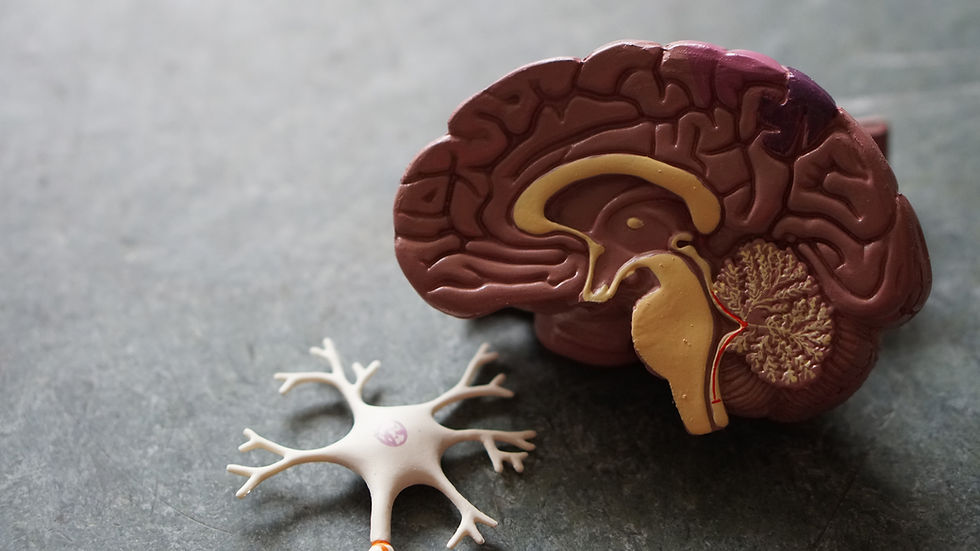Testing Neurotransmitters for Mental Health
- thekidstherapycenter
- Apr 29, 2025
- 2 min read

Neurotransmitters are chemicals that help neurons in the brain and nervous system communicate. They affect mood, behavior, thinking, and physical functions. Testing their levels can give important information about mental and physical health, helping diagnose and treat various conditions. This includes knowing the different types of neurotransmitters and how they can be inhibitory or excitatory.
Reasons to Test Neurotransmitters
Mental Health: Imbalances can cause mood disorders, anxiety, depression, and more. Testing helps create targeted treatments to balance these chemicals.
Cognitive Function: Changes can impact memory, focus, and attention, helping identify diseases like Alzheimer’s, Parkinson’s, or ADHD.
Chronic Fatigue and Sleep Disorders: Imbalances in serotonin and dopamine are linked to sleep issues and fatigue; testing levels can help diagnose conditions like insomnia or chronic fatigue syndrome.
Pain and Inflammation: Abnormal levels can contribute to fibromyalgia, migraines, or chronic pain.
Addiction and Substance Use Disorders: Testing helps understand addiction, cravings, and withdrawal symptoms, as dopamine plays a key role in the brain's reward system.
Inhibitory vs. Excitatory Neurotransmitters
Excitatory: Increase the chance of neuron firing, supporting cognitive functions like learning and memory. Examples: Glutamate, norepinephrine.
Inhibitory: Decrease the chance of neuron firing, calming brain activity. Examples: GABA, serotonin.
Types of Neurotransmitters
Neurotransmitters are divided into excitatory or inhibitory based on their effects on neurons. Key neurotransmitters include:
1. Dopamine (Excitatory & Inhibitory)
Regulates mood, motivation, and reward. Imbalances are linked to depression, schizophrenia, Parkinson’s, and ADHD.
2. Serotonin (Inhibitory)
Regulates mood, sleep, appetite, and pain. Low levels are linked to depression, anxiety, and sleep issues.
3. Norepinephrine (Excitatory)
Involved in alertness and stress response. High levels can lead to anxiety, while low levels can cause depression.
4. Gamma-Aminobutyric Acid (GABA) (Inhibitory)
Reduces neuron activity, affecting anxiety and stress. Low levels are linked to anxiety disorders and epilepsy.
5. Glutamate (Excitatory)
Important for learning and memory. Too much can lead to neurodegenerative diseases.
6. Phenylethylamine (PEA) (Excitatory)
Associated with excitement and pleasure. Imbalances can affect mood and thinking.
A balance between excitatory and inhibitory neurotransmitters is essential for mental health, cognitive abilities, and emotional well-being. Testing neurotransmitters helps us understand brain function and address health issues, providing a useful tool for personalized treatments and better brain health.
Call The Kid's Therapy Center at 701-751-0384 to ask about our testing options!
nutraMetrix NutriClean® Advanced Fiber Powder with Stevia

Primary Benefits* of nutraMetrix NutriClean® Advanced Fiber Powder with Stevia
Helps maintain digestive health
Helps cleanse the colon
Promotes colon health
Promotes healthy growth of beneficial bacteria in the colon
Helps maintain proper levels of intestinal microflora
Supports healthy nutrient absorption
Helps the body maintain a healthy bacterial balance
Supports healthy intestinal function
Helps support normal bowel regularity and fecal volume
Helps maintain balanced bowels
Helps relieve occasional constipation
Provides fuel for cells lining the small intestine
Supports overall health by helping to maintain normal cholesterol levels
Click below to order supplements:
*These statements have not been evaluated by the Food and Drug Administration. This product(s) is not intended to diagnose, treat, cure or prevent any disease.




Comments